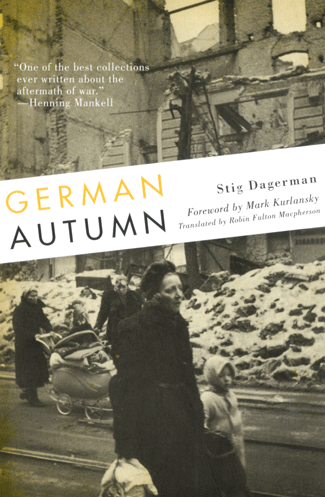Reviewed by NEAL GENDLER
Although the Torah frowns on joy at other people’s suffering, perhaps Jews may be permitted, if not Schadenfreude, at least some lack of sympathy at the postwar hardship of millions of Germans.
In German Autumn, Stig Dagerman paints an unremittingly dismal picture of the defeated perpetrators of World War II in the gloom of November 1946. This first American edition is worthy reading, especially for those for whom the war is mostly a distant event in black and white. Essential background is provided in American author Mark Kurlansky’s foreword and translator Robin Fulton Macpherson’s introduction.
Dagerman, an acclaimed Swedish writer at 23, traveled across the United States and British zones as rain, cold and snow enveloped a crumbled, occupied and impoverished nation. Although many country Germans apparently lived much as before, particularly in little-damaged Bavaria, those struggling amid the skeletons of shattered and burned cities get most of Dagerman’s attention.

There was a hierarchy of shelter: the least poor in their prewar homes, the middling poor one family to a room in abandoned tenements, the poorest in former prison cells, bunkers or cellars of ruins — sometimes in a foot or two of fetid water.
Dagerman writes of the difficulty of finding food and coal; of ragged children in windowless classrooms with single light bulbs and few books or supplies; of difficulty traveling; and of farcical denazification courts.
Dagerman, an antifascist, is dispassionate — not saying these people deserved their misery, but showing scant sympathy for anyone but children. Allied occupiers appear mostly as drunken young soldiers with young German women who live off them.
Some Germans still didn’t get it.
“It is high time the Allies stopped punishing us,” a woman tells Dagerman. “Whatever people say about us Germans and what our soldiers have done in other countries, we have not deserved the punishment we are now getting.”
Jews, Poles and Russians, especially, might have begged to differ.
The woman tells him “the popular and unfortunately too-well-confirmed story” of a British captain who, when asked why the English would not let Hamburg’s railway stations be rebuilt, replied: “Why should we help you Germans to get on your feet in three years when it could just as well take 30?”
Why indeed? Germany only bled Britain nearly white twice in 21 years.
Eighteen months into peace, Germans are not at peace with themselves: city vs. country, the poorest vs. the less poor, young vs. old. A Nazi prosecutor now is a prosperous farmer; his victims starve. Hordes of homeless, pfennig-less Germans have fled the Soviet Zone, overwhelming their western countrymen.
Further burdensome are ethnic Germans expelled from Poland, Czechoslovakia and further east. That refugee tsunami some estimate at 12 million now is all but forgotten amid fixation on the descendants of about 800,000 Palestinian Arabs — people replaced by a near-equal number of Jews whose flight from Arab lands also is nearly forgotten.
If conditions were this bad in Germany 18 months after war’s end, they must have been even worse in November 1945. But while reading Dagerman’s calm description of squalor and despair, my mind plays newsreels from a decade earlier: joyous throngs at rallies and parades, right arms held out stiff.
Germany, of course, rose from the depths thanks to its industriousness, and to Allied transformation of it from enemy to ally against a Soviet expansionism that also eroded Western interest in prosecuting Nazis. Today’s Germany is peaceful, very supportive of Israel — as well it should be — and the prosperous powerhouse of Europe.
The last two must have been unimaginable when Dagerman’s accounts appeared as a series of newspaper reports, then as a book in 1947. I wonder about the reactions of his Swedish readers. Perhaps some felt Germans were getting their due. Perhaps others viewed their suffering Aryan cousins with pity.
I don’t.
***
Neal Gendler is a Minneapolis writer and editor.
(American Jewish World, 11.25.11)




















Mr Gendler is clearly no historian but at least he can read and it is a pity that he read through Dagerman´s book without really seeing what Dagerman attempted. If I had
thought that the book amounted to no more than the kind of simplistic propaganda which Mr Gendler makes of it, I would never have gone to the trouble of translating it and persuading a London publisher to bring out the first British edition.